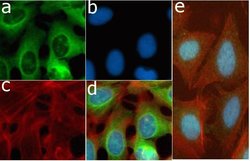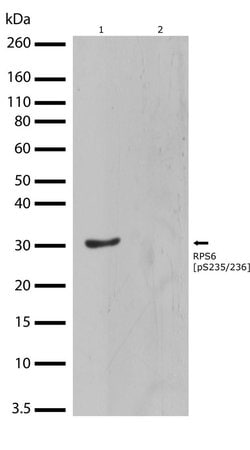Learn More
Invitrogen™ Phospho-S6 (Ser235, Ser236) Recombinant Superclonal™ Antibody (4HCLC)
Rabbit Recombinant Superclonal Antibody
Supplier: Invitrogen™ 710394
Description
This antibody is predicted to react with bovine, goat, non-human primate, mouse and rat based on sequence homology. Recombinant rabbit Superclonal™ antibodies are unique offerings from Thermo Fisher Scientific. They are comprised of a selection of multiple different recombinant monoclonal antibodies, providing the best of both worlds - the sensitivity of polyclonal antibodies with the specificity of monoclonal antibodies - all delivered with the consistency only found in a recombinant antibody. While functionally the same as a polyclonal antibody - recognizing multiple epitope sites on the target and producing higher detection sensitivity for low abundance targets - a recombinant rabbit Superclonal™ antibody has a known mixture of light and heavy chains. The exact population can be produced in every lot, circumventing the biological variability typically associated with polyclonal antibody production. Note: Formerly called Recombinant polyclonal antibody, this product is now rebranded as Recombinant Superclonal™ antibody. The physical product and the performance remain unchanged.
Ribosomes, the organelles that catalyze protein synthesis, consist of a small 40S subunit and a large 60S subunit. Together these subunits are composed of 4 RNA species and approximately 80 structurally distinct proteins. This gene encodes a cytoplasmic ribosomal protein that is a component of the 40S subunit. The protein belongs to the S6E family of ribosomal proteins. It is the major substrate of protein kinases in the ribosome, with subsets of five C-terminal serine residues phosphorylated by different protein kinases. Phosphorylation is induced by a wide range of stimuli, including growth factors, tumor-promoting agents, and mitogens. Dephosphorylation occurs at growth arrest. The protein may contribute to the control of cell growth and proliferation through the selective translation of particular classes of mRNA. As is typical for genes encoding ribosomal proteins, there are multiple processed pseudogenes of this gene dispersed through the genome.
Specifications
| Phospho-S6 (Ser235, Ser236) | |
| Recombinant Superclonal | |
| 0.5 mg/mL | |
| PBS with 0.09% sodium azide | |
| P62753 | |
| RPS6 | |
| proprietary. | |
| 100 μg | |
| Primary | |
| Human | |
| Antibody | |
| IgG |
| Western Blot, Immunocytochemistry | |
| 4HCLC | |
| Unconjugated | |
| RPS6 | |
| (Rp)S6; 40S ribosomal protein S6; air[8]; air8; anon-WO02059370.61; CG10944; CG10944-PA; CG10944-PB; Dmel\CG10944; Dmel_CG10944; DS6; hemocytes enlarged; hen; l(1)air[8]; l(1)air8; l(1)hen; LD31286p; lethal(1)aberrant immune response[8]; lethal-(1)-haemocytes enlarged; lethal-aberrant-immune-response-8; M(1)7BC; M(1)7C; minute; minute (1) 7BC; OK/SW-cl.2; OTTHUMP00000021121; OTTHUMP00000021122; Phosphoprotein NP33; pp30; ribosomal protein S6; Rp S6; RP11-513M16.6; RPS6; RpS6-PA; RpS6-PB; RS6; S6; S6 ribosomal protein; S6R; Small ribosomal subunit protein eS6; wu:fa92e06; wu:fb64g06; zgc:92237 | |
| Rabbit | |
| Protein A | |
| RUO | |
| 6194 | |
| Store at 4°C short term. For long term storage, store at -20°C, avoiding freeze/thaw cycles. | |
| Liquid |
Your input is important to us. Please complete this form to provide feedback related to the content on this product.

